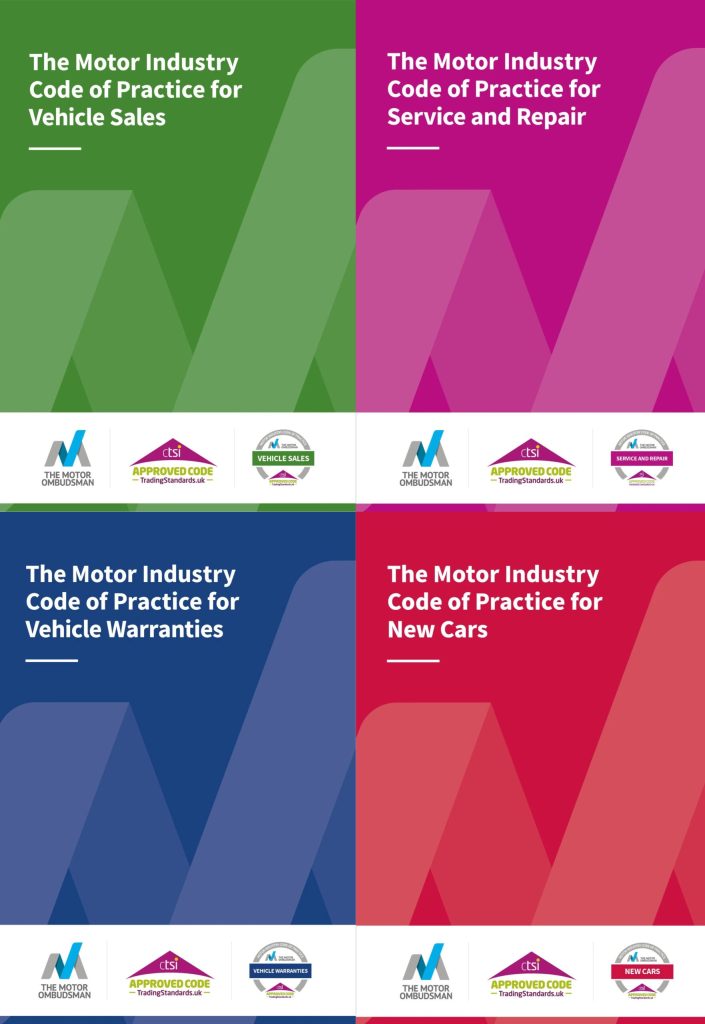The Motor Ombudsman expands the scope of its Codes of Practice to reflect the UK’s evolving automotive landscape
- The Motor Ombudsman’s four established CTSI-approved Motor Industry Codes of Practice have been updated to reflect the changing face of the UK’s automotive landscape, technological innovation, and shifts in consumer buying behaviour
- The long-established and comprehensive Codes are central to the self-regulation of the motor industry, and to driving even higher standards of work throughout the customer vehicle purchase and ownership experience
- Today, more than 7,500 vehicle retailers and repairers across the UK, in addition to 46 vehicle manufacturers and 21 extended warranty providers, are committed to abiding by the Codes
- Motor Ombudsman-accredited businesses have been consulted and supported with the roll-out of the updated Codes of Practice via a series of online training initiatives, and the introduction of tailored resources explaining the latest changes and their application

The Motor Ombudsman has unveiled its newly updated Motor Industry Codes of Practice to broaden their scope in line with the changing face of the UK’s automotive sector, which has seen the evolution of legislation, technological innovation, and shifts in consumer buying behaviour. The four refreshed Codes of Practice, which cover the entire customer vehicle purchase and ownership experience, take immediate effect, and write a new chapter in the history of the long-established and comprehensive best practice guidelines for businesses in the motor industry.
Today, The Motor Ombudsman’s comprehensive portfolio of Chartered Trading Standards Institute (CTSI)-approved Codes of Practice play an integral role in the self-regulation of the automotive sector, and more than 7,500 independent garages and franchise dealers, as well as 46 vehicle manufacturers and 21 extended vehicle warranty providers, have voluntarily committed to delivering high standards of work and service to consumers beyond those required by law. In tandem with UK legislation, the best practice clauses contained across the four Codes are equally central to the delivery of independent, impartial and fair decisions based on the evidence submitted to The Motor Ombudsman by consumers and businesses.
With further changes brought to the Codes over the past decade since The Motor Ombudsman was established in 2016, such as the recent extension of the Service and Repair Code to cover consumers using accredited mobile repairers, the latest amendments, which have been incorporated following a period consultation with Motor Ombudsman-accredited businesses and the Chartered Trading Standards Institute (CTSI), have been made to evolve existing guidelines in line with the fast-changing trajectory of the automotive sector. On this point, the Codes see the addition of a new series of sections and commitments to reflect the incorporation of new technologies within vehicles, the expansion of manufacturer retailing channels, the wide range of insured and non-insured products and services now on offer to customers when purchasing and owning a vehicle, and the growing prominence of alternative fuelled vehicles (AFVs), such as electric cars (EVs).
The principal changes incorporated within The Motor Ombudsman’s evolved Motor Industry Codes of Practice, are namely:
- The addition of specific clauses relating to Advanced Driver Assistance Systems (ADAS) and self-driving features;
- New guidance for the delivery of roadside assistance and service plans;
- Dedicated sections on paint, perforation and manufacturer base warranties, and in relation to guidelines on the sale of alloy wheel and Guaranteed Asset Protection (GAP) insurance;
- The introduction of a requirement for staff training in relation to the maintenance of alternatively-fuelled vehicles (AFVs), such as electric cars and hybrids; and
- Clauses governing the sale of vehicles where an agency model has been adopted by vehicle manufacturers.
The four Codes of Practice equally feature a refreshed visual identity incorporating the recently updated Chartered Trading Standards Institute (CTSI) Approved Codes insignia.

“With our Codes of Practice established as a key driving force in the self-regulation of the UK’s motor industry, it is important that they remain aligned and keep pace with technological advancements and innovation, as well as with the latest trends in consumer buying behaviour, so as to provide the best possible level of coverage and protection. This is especially pertinent as the profile of car ownership changes more profoundly over the coming years, as a gradual shift is made away from the internal combustion engine on the road to 2030 and beyond. To enable a smooth transition to the refreshed Codes of Practice, we have been consulting and supporting accredited businesses with a number of training initiatives and additional resources to ensure that the industry is fully up to speed with the changes, which take immediate effect.”
Bill Fennell
Chief Ombudsman and Managing Director at The Motor OmbudsmanTo view The Motor Ombudsman’s Codes of Practice, visit www.TheMotorOmbudsman.org/ consumers/our-codes-of-practice.



